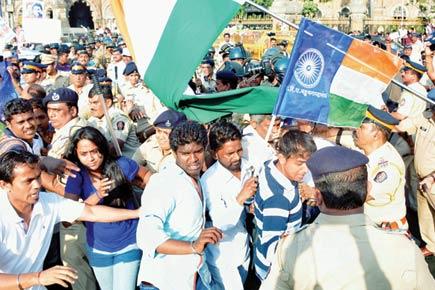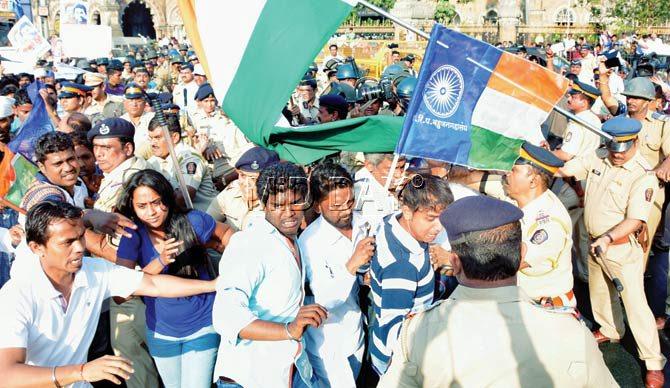Rohith Vemula’s death is a classic Orwellian tragedy, seen not just in the BJP’s doublespeak, but also the fizzling public outrage

 The attitude of the ruling BJP government towards the death of Rohith Vemula has been confusing and contradictory. Or has it? For the first few days after Vemula’s suicide note started doing the rounds, various BJP leaders and ministers assured the nation that Vemula had not been discriminated against, that he was not a Dalit as was being claimed, that he was, in fact, “anti-national”, that they had to do something when a member of their students’ wing ABVP was assaulted, that Vemula supported terrorists, that the university had not done anything wrong, that there was no oppression of lower castes in India. All right, I made the last one up but it may well have been said.
The attitude of the ruling BJP government towards the death of Rohith Vemula has been confusing and contradictory. Or has it? For the first few days after Vemula’s suicide note started doing the rounds, various BJP leaders and ministers assured the nation that Vemula had not been discriminated against, that he was not a Dalit as was being claimed, that he was, in fact, “anti-national”, that they had to do something when a member of their students’ wing ABVP was assaulted, that Vemula supported terrorists, that the university had not done anything wrong, that there was no oppression of lower castes in India. All right, I made the last one up but it may well have been said.
ADVERTISEMENT

Cops try to control the crowd of Dalit students outside Chhatrapati Shivaji Terminus, protesting the suicide of Hyderbad Central University scholar, Rohith Vemula, on Monday. Pic/Sayed Sameer Abedi
The Union HRD minister, Smriti Irani, whose ministry was part of the chain of events that led to Vemula’s suicide, lied in her press conference when she said that the decision to suspend Vemula for his supposed “anti-national” activities was taken by a Dalit professor. She also hedged on the reasons why the HRD ministry pushed Hyderabad Central University to take action against members of the Ambedkar Students’ Association. She then played what she thought was her trump card: the great warning by a political party member that this issue “should not be politicised”.
However, calling someone “anti-national” is a political statement. Fighting against discrimination is a political issue. And when a ministry jumps in to protect a political activist on the basis of a letter written by a member of the ruling political party, it is definitely a political issue.
Soon after this incredible drama of insensitivity and lack of compassion, the prime minister of India woke up, five days later. He said he wept because Mother India had lost a son, referencing an iconic Indian film where a mother kills her beloved younger son for tragic but ultimately political, social and moral reasons. Promptly, the Union HRD ministry ordered an inquiry into the treatment of Dalit students in institutions of higher education.
This may have led some people to think that once the prime minister had spoken, the narrative on the issue of Dalits, anti-nationals and Vemula within the BJP would change. How very naive. A week later, Union External Affairs Minister Sushma Swaraj reiterated that Vemula was not even a Dalit and Kailash Vijayavargiya, BJP MLA in Madhya Pradesh, wondered whether Vemula had even committed suicide. This is an extraordinary claim, since the poor boy is dead, but not so extraordinary when you consider how Vemula’s poetic and moving suicide note underlined not just his own problems but Indian society’s problems as well.
In fact, what you have here is a classic Orwellian tactic from the BJP. The first set of ministers and BJP leaders addressed their core vote banks: the upper castes and also assured the ABVP that the party was on the students’ wing’s side. Narendra Modi spoke to the rest of India in all the pomposity of being prime minister and, therefore, above this sort of thing. But take Modi’s statement apart and it actually means nothing. He would also feel bad if a car he was sitting in ran over some puppies. He now feels bad that someone has died. The issues and questions surrounding Vemula’s death and the treatment he received before he died have not been addressed by the prime minister and nor did he address it in his ‘Mann ki Baat’ radio musings to the nation.
And soon after Modi’s tears dried, the BJP is back, assuring its voters that it is against such “anti-nationals” as Vemula by trying to diminish him — as has been done to Dalits and the downtrodden for aeons. The outrage in some sections of India, after the details of what happened in Hyderabad University emerged, may have shaken the government and ruling party a bit, but that did not last long. The caste fissures in India are strong and millennia-old and have remained nurtured even if caste discrimination is illegal. We all know what the truth is, no matter how much we pretend otherwise.
Sadly, this could have been an opportunity for the Centre and the BJP to rise above electoral pettiness and address the horror of this problem. Instead we have despicable doublespeak between various members of the ruling BJP.
Ranjona Banerji is a senior journalist. You can follow her on Twitter @ranjona
 Subscribe today by clicking the link and stay updated with the latest news!" Click here!
Subscribe today by clicking the link and stay updated with the latest news!" Click here!







